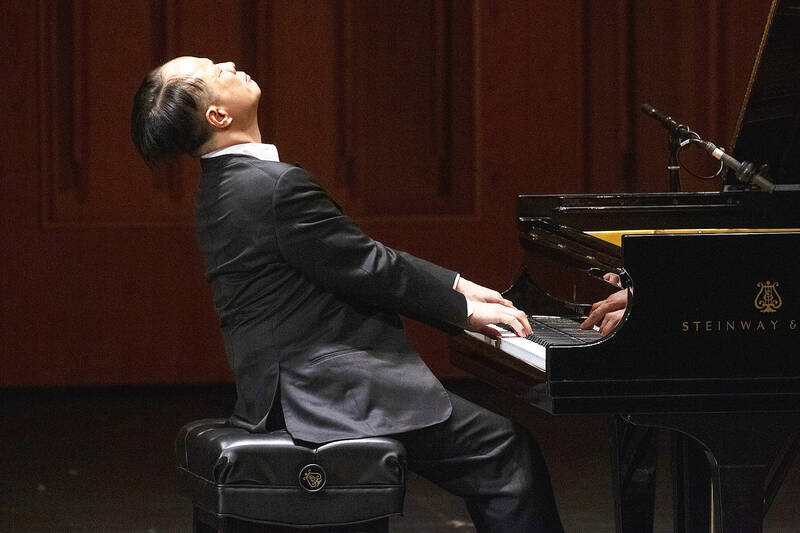Internationally acclaimed pianist Chen Ruei-bin (陳瑞斌) will be marking the 40th anniversary of the death of talented Taiwanese composer Chiang Wen-ye (江文也) at his concert next Tuesday.
Chen, who was born in Taiwan and moved to Austria to study music as a teenager, has been promoting Chiang’s work across the globe for many years. Chiang died on Oct. 24, 1983.
Chiang, a Hakka who’s been dubbed the “Chopin of the East,” also left Taiwan at a young age, studying in Japan and later working in Beijing as a music professor. He remained in China after the Chinese Civil War and never returned home.

Photo courtesy of Chen Ruei-bin
Chiang often expressed his yearning for his homeland in his work — including Formosan Dance (台灣舞曲), which won a medal for music during the 1936 Olympics. This made Chiang the first Taiwanese to win an Olympic medal and the only Asian to ever win a music medal in Olympic history.
Chen will be presenting Formosan Dance alongside two other works of Chiang at his upcoming recital at the National Concert Hall.
He says that he can hear Chiang’s profound nostalgia and longing for Taiwan in the piece, and the pain of not being able to return home deeply resonates with him.
In addition to Chiang’s pieces, Chen will also perform a number of works by European composers that have been featured in popular movies and dramas — including Chopin’s Balakirev: Transcription of Romance from Chopin’s Piano Concerto No.1 that appeared in the hit Korean drama Stairway to Heaven, as well as Variation 18 of Sergei Rachmaninoff’s Rhapsody on a Theme of Paganini from the beloved American classic Somewhere in Time.
■ Tuesday at 7:30pm, National Concert Hall, 21-1 Zhongshan S Rd, Taipei City (台北市中山南路21-1號), tickets range from NT$300 to NT$5,200
■ On the Net: www.facebook.com/rcpianist

As I finally slid into the warm embrace of the hot, clifftop pool, it was a serene moment of reflection. The sound of the river reflected off the cave walls, the white of our camping lights reflected off the dark, shimmering surface of the water, and I reflected on how fortunate I was to be here. After all, the beautiful walk through narrow canyons that had brought us here had been inaccessible for five years — and will be again soon. The day had started at the Huisun Forest Area (惠蓀林場), at the end of Nantou County Route 80, north and east

Specialty sandwiches loaded with the contents of an entire charcuterie board, overflowing with sauces, creams and all manner of creative add-ons, is perhaps one of the biggest global food trends of this year. From London to New York, lines form down the block for mortadella, burrata, pistachio and more stuffed between slices of fresh sourdough, rye or focaccia. To try the trend in Taipei, Munchies Mafia is for sure the spot — could this be the best sandwich in town? Carlos from Spain and Sergio from Mexico opened this spot just seven months ago. The two met working in the

Exceptions to the rule are sometimes revealing. For a brief few years, there was an emerging ideological split between the Democratic Progressive Party (DPP) and Chinese Nationalist Party (KMT) that appeared to be pushing the DPP in a direction that would be considered more liberal, and the KMT more conservative. In the previous column, “The KMT-DPP’s bureaucrat-led developmental state” (Dec. 11, page 12), we examined how Taiwan’s democratic system developed, and how both the two main parties largely accepted a similar consensus on how Taiwan should be run domestically and did not split along the left-right lines more familiar in

This month the government ordered a one-year block of Xiaohongshu (小紅書) or Rednote, a Chinese social media platform with more than 3 million users in Taiwan. The government pointed to widespread fraud activity on the platform, along with cybersecurity failures. Officials said that they had reached out to the company and asked it to change. However, they received no response. The pro-China parties, the Chinese Nationalist Party (KMT) and Taiwan People’s Party (TPP), immediately swung into action, denouncing the ban as an attack on free speech. This “free speech” claim was then echoed by the People’s Republic of China (PRC),